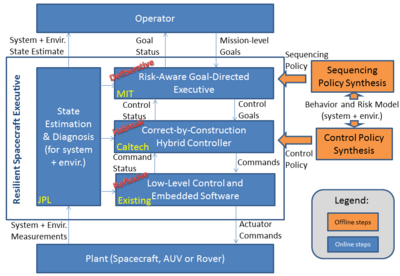Resilient Risk-Aware Autonomy for the Exploration of Uncertain and Extreme Environments
This is a joint project between Caltech, JPL, MIT and WHOI, jointly supported by the Keck Institute for Space Studies (KISS) and the Jet Propulsion Laboratory (JPL).
| Current participants:
Past participants:
|
Collaborators:
|
Overview
This effort will develop an innovative software architecture that will endow spacecraft with unprecedented levels of resilience, and then demonstrate how it can reduce risk and cost through capabilities such as unattended, long-distance traverses. This effort builds on and supports research efforts at Caltech, JPL, MIT and the Woods Hole Oceanographic Institution (WHOI). To achieve these objectives, we will mature and integrate key technologies in (i) goal-directed and risk-aware execution/decision-making, (ii) correct-by-construction control policy synthesis, and (iii) model-based systems engineering approaches that facilitate development of the underlying models used in these technologies. Another key technology contribution will be the development of a rigorous architectural analysis framework, enabling system designers to perform tradeoffs between key characteristics (e.g., flexibility versus reaction time) associated with the allocation of capabilities to the different layers of our architecture (deliberative, habitual, and reflexive—analogous to human behavior).
Publications and Reports
- Application of Correct-by-Construction Principles for a Resilient Risk-Aware Architecture. Catharine L. McGhan and Richard M. Murray. AIAA Space 2015 Conference and Exposition.
- A Risk-Aware Architecture for Resilient Spacecraft Operations. Catharine L. R. McGhan, Richard M. Murray, Romain Serra, Michel D. Ingham, Masahiro Ono, Tara Estlin and Brian C. Williams. Submitted, 2015 IEEE Aerospace Conference.
- KISS proposal, 1 April 2014.
|
|
|
